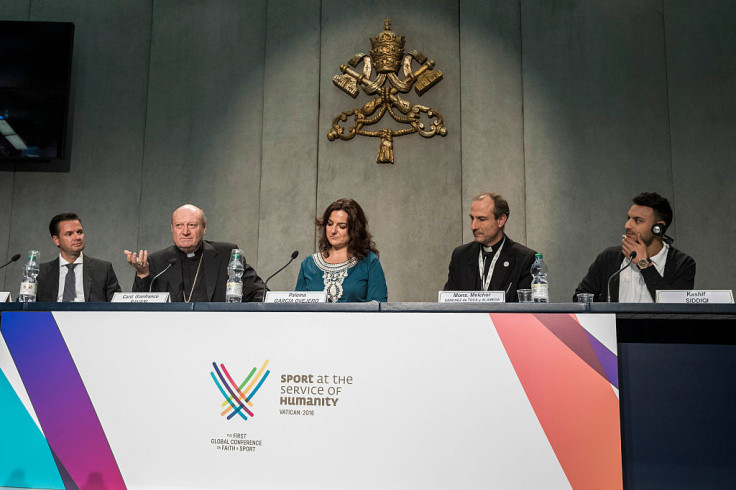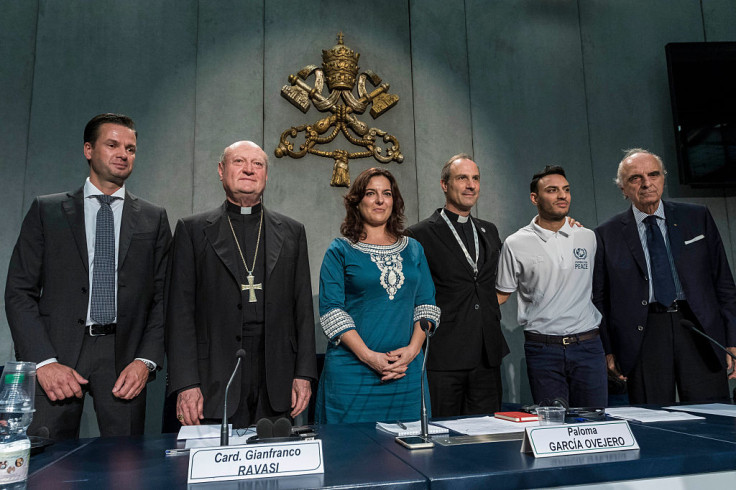Peacemaker Kashif Siddiqi to meet Pope Francis and launch first 'Sport and Humanity' conference at Vatican
Siddiqi is a British-Muslim footballer who wants to spread the message of peace throughout the world through the sport.
Football for Peace co-founder Kashif Siddiqi is out on a mission and wants to use the sport as a tool to bring harmony across the world. The former Arsenal defender's foundation is a diplomatic sports movement that creates dialogue to unite the masses and believes that people from different religions, colour, culture, business and academia can work together to better serve humanity.
Siddiqi was born in Hammersmith and faced cultural differences during his childhood, which resulted in him being isolated. He believes that there are millions of people who are affected directly or indirectly through marginalisation and wants to break these barriers through sports.
The 30-year-old's mother had moved to the UK from Uganda and faced a lot of challenges in country. In an exclusive interview with IBTimes UK, Siddiqi explained with pride how his mother was in raising him. He noted that he got a cosmopolitan view of society after his mother took him to churches, gurudwaras (the place of worship of Sikh community) and temples, even though he came from a British-Muslim family.
He stressed on the importance of football in his life and how it helped him break barriers. He is hopeful that the sport will help him unite people and restore peace in a region or a country.
"The cultural differences started way back in Africa. My mother is from Africa and she grew up at a time when Idi Amin was in power and there was tension in the region. Extremism from their end saw her leave the country and her obviously coming to the UK," Siddiqi told IBTimes UK.
"I faced numerous cultural differences while growing up [in the UK] and being isolated is an example of its ill-effects. For me to get in to football as a professional was challenging as it is traditionally 'English culture'.
"Sports can really help break down these barriers and start channels of dialogues. And this is what it [football] did for me.
"The inspiration comes from my mother because of her journey from Africa, her struggles and problems she faced. I was thought that at end of the day, I need to believe that humanity should be equal.
"It is because of the colour of your skin or faith or background, you are isolated and you go through terrible situations in life. The way she's raised me and made me think with a level head, is impressive. From a young age, she took me to churches, gurudwaras and temples even though we are from a British-Muslim heritage. That gave me a cosmopolitan outlook and I had that balance while I was playing sports," he said.
Chile legend Elias Figueroa had founded "Football for Peace" in 2006. Although the foundation organised football matches, it did much more by giving away free food to orphanages across the continent.
In 2013, Figueroa formed a team with Siddiqi and they brought the non-profit organisation to the UK. But the London-born footballer had a vision and he wanted to take their cause to the global level.

"The actual concept of Football for Peace started in South America in 2006. Our co-founder is Elias Figueroa, South American legend. Their concept was a bit of different, it was around raising awareness by bringing South American players to come and play football," he explained.
"They had matches, but they never had anything to do with the match. They would distribute food to orphanages across South America. Coming to this side of the world in 2013 was a bit different, because the world we are living in currently is full of misunderstandings and tensions.
"I want to use football in a different way as I'm a South Asian footballer and there are not that many in this country. I wanted to unite people on the same platform, hence in 2013 I co-founded it to bring it to this side of the world. We launched it along with the United Nations. Since then, we have grown at a rapid pace.
"When I partnered with Elias, it was kind of a turning point. The vision I had was not at the national level, but on an international level. With Football for Peace we have already hosted two international peace matches and we held numerous games in cities around the world.
"The first international match was played in Easter Island in Chile. These indigenous tribes got a history of conflict and war. There are 3,000 people on the Island and it is the furthest place on Earth.
"We applied our peace process and we got Rapa Nui tribes together and play in the same team. And in 2015, we bought Afghanistan and Great Britain to play in a five-a-side match in the UK. They played against footballers for peace and UN ambassadors."
"So I think the process, since we started has got support from many people. We had Pele, Prince Ali bin Hussein of Jordan and Ronaldinho, endorse our events."
Speaking about his project in India, he said that one thing that is close to his heart is women empowerment. "In some countries we work with women and girls. So the Kozhikode project (in southern India) involves around 10 schools and girls coach boys at these schools. These girls then go on to become our peace ambassadors."

Siddiqi's work to spread the message of peace across the world through football has helped earn an invite for the "Sport at the Service of Humanity", which is the first world meeting of faith and sports to be held in the Vatican from 5 to 7 October.
Siddiqi will meet Pope Francis for the second time – they had first met in 2014 – as the latter is the guest of honour for the opening ceremony of the global event alongside UN secretary-general Ban Ki-moon, and president of the International Olympic Committee, Thomas Bach.
He is set to pitch for a football match between people of different races and religions in the coming months at St Peter's Square. Football for Peace and believes with the help of the pope, and other dignitaries, the peace organisation can grow at a faster rate.
To know more about Football for Peace, visit their official website by clicking here.
© Copyright IBTimes 2025. All rights reserved.






















